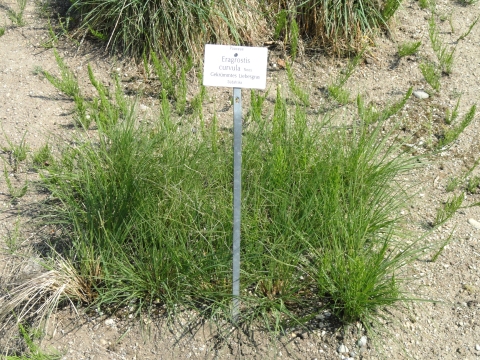Eragrostis curvula
(Schrad.) Nees
Poaceae
Eragrostis capillifolia Nees
Eragrostis chloromelas Steud.
Eragrostis filiformis (Thunb.) Nees
Eragrostis huillensis Rendle
Eragrostis jeffreysii Hack.
Eragrostis lehmanniana ampla Stapf
Eragrostis poa Stapf
Eragrostis procerior Rendle
Eragrostis pubiculmis Jedwabn
Eragrostis robusta Stent
Eragrostis subulata Nees
Eragrostis thunbergiana Steud.
Eragrostis valida Stent
Poa atrovirens Nees
Poa capensis Steud.
Poa curvula Schrad.
Poa filiformis Thunb.
Common Name: Weeping Love Grass

Cultivated plant in the Botanischer Garten München-Nymphenburg, Munich, Germany
Photograph by: Daderot
Public domain
General Information
Weeping love grass is a densely clump-forming perennial grass with culms up to 1 metre tall[
332- Title
- The Useful Plants of West Tropical Africa.
- Publication
-
- Author
- Burkil. H. M.
- Publisher
- Royal Botanic Gardens; Kew.
- Year
- 1985 - 2004
- ISBN
-
- Description
- Brief descriptions and details of the uses of over 4,000 plants. A superb, if terse, resource, it is also available electronically on the Web - see http://www.aluka.org/
].
The plant is sometimes harvested from the wild for local use as a food and source of materials. It can be used in soil stabilization projects.
Known Hazards
None known
Botanical References
200- Title
- The New RHS Dictionary of Gardening. 1992.
- Publication
-
- Author
- Huxley. A.
- Publisher
- MacMillan Press
- Year
- 1992
- ISBN
- 0-333-47494-5
- Description
- Excellent and very comprehensive, though it contains a number of silly mistakes. Readable yet also very detailed.
,
266- Title
- Flora of China
- Publication
-
- Author
-
- Website
- http://flora.huh.harvard.edu/china/
- Publisher
- Missouri Botanical Garden Press; St. Louis.
- Year
- 1994
- ISBN
-
- Description
- An excellent, comprehensive resource in 25 volumes. In addition to the botanical information the flora also gives basic information on habitat and some uses. An on-line version is also available.
,
308- Title
- Flora Zambesiaca
- Publication
-
- Author
-
- Website
- http://apps.kew.org/efloras/fz/intro.html
- Publisher
-
- Year
- 0
- ISBN
-
- Description
- An excellent online flora of plants from the Zambezi River basin. It lists a number of the plant uses as well as the habitats and botanical descriptions of the plants.
Range
Africa - Cameroon, DR Congo, Eritrea, Ethiopia, Kenya, Burundi, Tanzania, Angola, Zambia, Malawi, Mozambique, south to S. Africa.
Habitat
Widespread, in montane grassland and in dambos, floodplain grassland, wooded grassland on Kalahari Sand, in miombo woodland and on rocky outcrops and hillsides; also in disturbed ground at roadsides; at elevations from 430 - 2,140 metres[
308- Title
- Flora Zambesiaca
- Publication
-
- Author
-
- Website
- http://apps.kew.org/efloras/fz/intro.html
- Publisher
-
- Year
- 0
- ISBN
-
- Description
- An excellent online flora of plants from the Zambezi River basin. It lists a number of the plant uses as well as the habitats and botanical descriptions of the plants.
].
Properties
| Edibility Rating |      |
| Other Uses Rating |      |
| Habit | Evergreen Perennial |
| Height | 1.20 m |
| Pollinators | Apomixy, Wind |
| Self-fertile | Yes |
| Cultivation Status | Wild |
Cultivation Details
Weeping love grass is a plant of the tropics and subtropics of Africa, widely cultivated as a pasture grass in other parts of the tropics. It grows best in areas where the mean annual temperatures are within the range 5.9 to 26.2°c and, when dormant, can survive temperatures down to about -5°c[
]. It prefers a mean annual rainfall in the range 310 - 1630mm[
].
Prefers an open, sunny position. Easily grown in most well-drained soils, preferring sandy loams[
200- Title
- The New RHS Dictionary of Gardening. 1992.
- Publication
-
- Author
- Huxley. A.
- Publisher
- MacMillan Press
- Year
- 1992
- ISBN
- 0-333-47494-5
- Description
- Excellent and very comprehensive, though it contains a number of silly mistakes. Readable yet also very detailed.
,
]. It is adapted to semi-arid and desert areas and sandy soils, growing well on low fertility soils[
]. Prefers a pH in the range of 5.0 to 8.2[
]. Once established, it is a very drought-resistant plant[
].
The roots contain pyrocatechol, suggesting an explanation for the plants resistance to nematodes[
].
The species and its varieties are apomictic (producing seed without fertilization) although sexual plants have occasionally been found[
].
Edible Uses
Seed - cooked[
]. Used as a grain[
]. The seed is small and fiddly to utilize - it is most commonly seen as a famine food, used when nothing better is available[
299- Title
- Protabase - Plant Resources of Tropical Africa.
- Publication
-
- Author
-
- Website
- http://www.prota.org
- Publisher
-
- Year
- 0
- ISBN
-
- Description
- An excellent on-line database with detailed information on over 3,200 species of useful plants of Africa.
].
Medicinal
None known
Agroforestry Uses:
A deep-rooted plant, it is considered excellent for protecting terraces and for grassing water channels and is valuable for erosion control[
].
Other Uses
The plant is used to make baskets, brooms, hats, ropes, and candles[
].
Propagation
Seed - sow in situ, only just covering the seed. Germination is usually very quick and free.
Division.
If you have any useful information about this plant, please leave a comment. Comments have to be approved before they are shown here.













 Useful Tropical Plants Database 2014 by
Ken Fern,
web interface by
Ajna Fern
with help from
Richard Morris.
Useful Tropical Plants Database 2014 by
Ken Fern,
web interface by
Ajna Fern
with help from
Richard Morris.